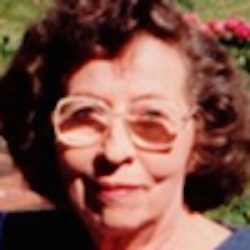
Frances Richardson Keller
(1914-2007)
Ph.D. University of Chicago, 1973
Long term lecturer 1978-1992
Frances Richardson Keller, 1914 - 2007
Frances Richardson Keller passed away on June 26, 2007. The cause of death was a stroke. Born on August 14, 1914 in Lowville, New York, Frances earned her bachelor’s degree in psychology at Sarah Lawrence College in 1935. Married soon after to Chauncey Keller, Frances had four children. Later divorced, Frances then earned a teaching certificate in history at the University of Toledo and taught in local public schools. In her late forties, she applied to doctoral programs in history. Her experience reflects what many women historians faced in the profession. Some institutions never even responded to her applications. The head of graduate studies at one Chicago area university told her that she was not a suitable candidate because of her gender and age. She then directly confronted the history chair at the University of Chicago, where she had also applied, asking, “Are you going to keep me out of here because I am over 35 and a woman?” She was admitted to Chicago in 1964 and became one of John Hope Franklin’s first graduate students there.
In the 1960s and early 1970s Frances, like many of her generation, experienced political activism—student, civil rights and women’s movements--experiences that impacted her entire professional life. Two main themes emerged in all of her writings: gender and race. Frances’s extensive publications include An American Crusade: The Life of Charles Waddell Chestnut (Brigham Young University, 1978), Views of Women’s Lives in Western Tradition (Edwin Mellen, 1989), Fictions of U.S. History: A Theory and Four Illustrations (Indiana University Press, 2002). In 2004 Rowman and Little republished her translation of Anna Julia Cooper’s Slavery and the French and Haitian Revolutionists (1988). In all of her works Frances tried to bring the marginalized to the center. Because of budget cuts in the 1970s, many historians, especially women, worked as adjunct faculty. Frances met the same fate, teaching as adjunct faculty all her life. In 1992-93, Frances retired from San Francisco State University, where she was recognized as an excellent teacher, inspiring students with her passion, commitment, and devotion to history. In 1997 Sarah Lawrence honored her as a distinguished alumna.
Frances devoted much time and labor to professional organizations. In the early 1970s, she joined the West Coast Association of Women Historians, now the Western Association of Women Historians (WAWH), which she served as president from 1981 through 1983. Seeking to promote women historians’ work, Frances helped found WAWH’s Sierra Prize, awarded annually for the best book written by a WAWH member. Thanks especially to Frances and her husband Bill Rhetta, the prize was fully endowed in 2006 and now carries an award of $800. In Frances’s honor, the WAWH Board renamed the award the Frances Richardson Keller-Sierra Prize.
Frances was also deeply involved in the Coordinating Committee on Women in the Historical Profession and the Conference Group on Women’s History (now combined as the Coordinating Council for Women in History, CCWH), affiliated with the American Historical Association. During the 1980s, Frances served as co-president of the CCWHP, raising funds for the award that later became the CCWH/Berkshire graduate student dissertation prize. As co-president Frances wrote numerous letters to members of Congress supporting increased funding for the NEH and NHPRC as well as to 800 CCWHP members urging them to protest the Supreme Court nomination of Robert Bork.
Frances Richardson Keller’s professional life and activism shed light on the experience of many women historians from the 1960s to the 1980s. She was not only a maker of history, as an individual and as a member of a professional generation, but also an institution builder and a mentor to many younger colleagues. With her death, historians, especially women historians, have lost a great friend.
Nupur Chaudhuri
Associate Professor of History
Texas Southern University